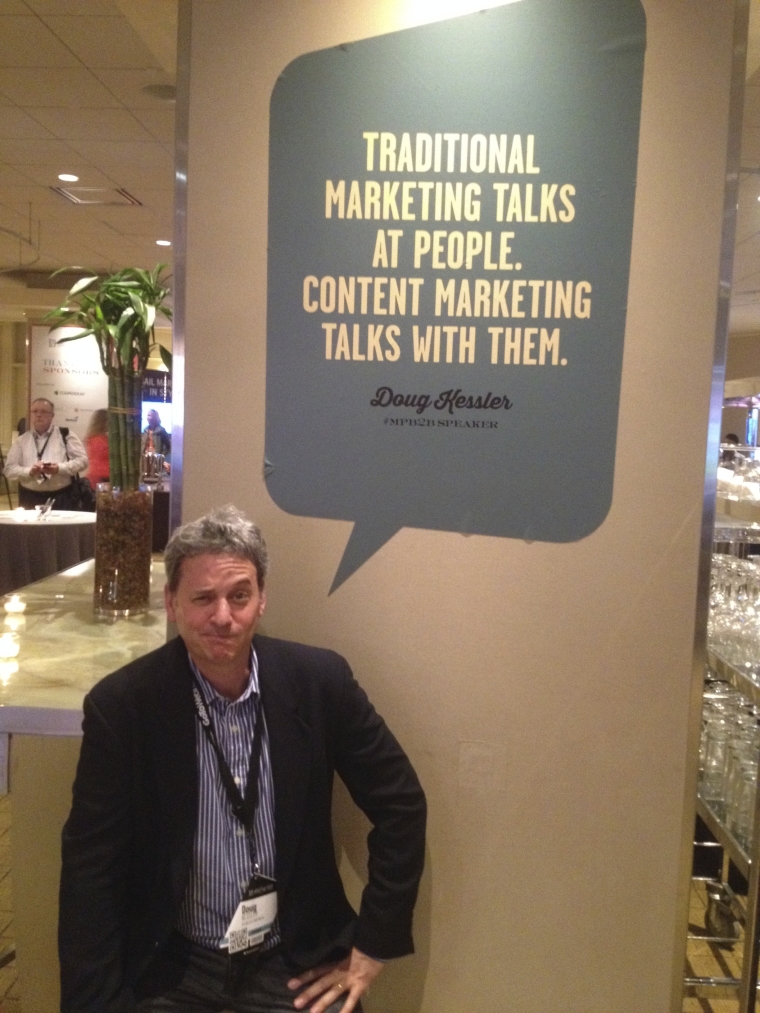As a Top 68 B2B Content Marketing Influencer, I’m often asked, “Doug,” I’m asked, “What does it feel like to be so influential?”
In answering that, I’d like to tell a little story. (Research shows that stories are the most effective way to reach into the tiny, adorably-constrained minds of non-influencers).
My Rise to Influence.
It may shock you to hear this, but I used to have no influence.
No one listened to me.
If I said, “The B2B content marketing world is going this way!” it had the same effect as a tree falling in an iPhone-free forest.
No content marketer ever laid an ego trap for me.
When they handed out the VIP badges at conferences, mine just said ‘P’.
Then I read a few books and got myself an imaginary Personal Brand Coach.
And everything changed.
I used to be just a person.
Now I am a Brand.
I’m on the shelf right alongside Tide and VW (pre-scandal) and ShamWow. (Disclosure: I have been given detergents and cars and wiping aids to test in my capacity as an influencer. I can’t remember if any were from these fine companies, but it would not alter my views one bit. I will only say here that, washed properly in a detergent like Tide ‘Free and Gentle’, the ShamWow makes the metallic body-coloured bumpers of the new VW Passat GT come up a treat).
I won’t go into the details of how I ascended the B2B Content Marketing Thought Leader Ladder, trampling on the heads of the scrupulous; using non-influencers as human kindling to feed the fire of my ambition; delegating to others every task that would not increase my Visibility, Access, Genuineness, Integrity, Notoriety and Authority (my guiding acronym, my mantra).
Suffice it to say that it involved countless Twitter marathons, more than my fair share of hashtags and a lot of name-kissing and ass-dropping. [Note to self: check metaphors]

In action: chairing a panel of fellow influencers that I invited personally. A still-unsolved calendar glitch left me solo, but hey: influencers think on their feet. I rocked the room.
And now, I’m a B2B Content Marketing Influencer.
When I influence, others are influenced. Put another way, I am influential.
When I say, “The B2B content marketing world is going this way!”, people look at my index finger, swivel their heads in that direction as if to say, “Where, Doug? There?”, then scurry off in that direction.

Licensed to Influence — me exerting some influence on the phone, using the brand new Nexus 6P (disclosure: Google gave me one to try out). (Not that this alters my view one bit about what is, in fact, a true challenger to the iPhone 6+, with it’s 5.7-inch high-resolution WQHD AMOLED display and front-facing speakers all housed in a contoured aluminum body). I am incorruptible.
By my own calculations, my Klout score is now in the mid-to-high six figures. (I say ‘my own calculations’ because the actual Klout algorithm clearly struggled, then collapsed under the size, scope and scale of my influence and resorted to spitting out a laughable 63. Catch up guys.).
These days, I get up two hours early on weekdays to respond to the many, many inbound requests from those lacking discernible influence, each hoping that some of my own would rub off on them. (If it were only that easy).
For I believe in giving back.

Influencers like to hang out with other influencers. No offense. (Yes, it’s my good friend Tom Wisher, pretending to ignore me. LOL.)

Practicing a Keynote Talk (well, a breakout session) on Juno. People don’t see the hard work that goes into being influential. (N.B. The kitchen is not usually this messy).
Giving back.
I’m not gonna lie: life as a B2B content marketing influencer is way more rewarding than my former life as an influence-challenged civilian.
It’s not about getting the best tables at the best B2B restaurants. Or the complementary mixed nuts in the B2B Influencer Lounge at most major and a growing number of minor airports (and I don’t mean the peanut-and-brazil blends with the occasional cashew shard. I’m talking whole almonds, my friend. I’m talking Macadamia.) .
It’s not that I get to skip the book-signing queues to share an insouciant air kiss with Ann Handley or Joe Pulizzi. (I call them ‘A-Dog’ and ‘JP’). (They call me ‘Duh’ — endearing diminutive for Doug… I think).
It’s not that the likes of Lee Odden, Michael Brenner, Jay Baer and Joe Chernov now return my emails if not immediately than within days or, very occasionally, weeks. (I am including auto-responders — let’s face it, these are busy, busy people and not without their own influencer obligations).
And it’s not that I am invited to speak to some of the biggest rooms in the B2B content marketing firmament. Rooms with more ch-chairs than you could ever imagine.
All these things are nice.
But what means the most to me is that I can use my influence to help people.
If a tweet of mine can send the download counters spinning on a previously moribund ebook landing page, I am only too happy to accept the fee.
If, with an almost imperceptible wave of my Influence Wand, I can lift a brand languishing in deepest obscurity and shove them two or three solid and measurable steps towards the harsh-but-profitable Klieg lights of B2B content marketing fame… why wouldn’t I?
And if, by simply lingering for a few moments after one of my International Keynotes, I can guide and inspire the non-influential-but-still-(I passionately believe)-valuable people – the huddled masses yearning to breathe free, if you will – then I believe it is my duty to do so. (That so few actually approach while so many rush off to implement my advice is, I think, a testament to the power of my methodology).
Make no mistake. Being a B2B Content Marketing Influencer is not just a privilege. It is also a responsibility. A responsibility that I take very seriously indeed.

This happens to be a rental car but it could very well be mine. I am an Avis Premier customer. I rarely queue.

Me practicing my Blue Steel against some random wall at the premier event of the B2B calendar, run by a dear, dear personal friend. Won’t name-drop here. (Hint: #abbading)
So, circling back, how does it feel to be a B2B Content Marketing Influencer?
I don’t want to be big-headed or anything here. Big-headedness will never be found in the Values and Beliefs section of my Personal Brand Guidelines document. (Instead you will find such old-fashioned ideas as Service. Humility. Idealism. Truth.).
But being a top B2B content marketing influencer feels darn great.
It feels… appropriate.
I have been a sycophant and I have been the object of sycophancy and I can tell you with very little reservation: the latter kicks the former’s butt.
Thank you for asking.
And if I can use my considerable influence to further any of your own personal brand goals, use the comments section below. My team (or my team’s people) (or their team) will action it on a first-come-first-influenced basis. Leave your sort code and account details to speed things along.

Enjoyed this article?
Take part in the discussion








Comments
Bob Apollo Inflexion-Point April 19th, 2016
Unit, corps, God, country…
Doug Kessler April 20th, 2016
In that order?
Tonto McClure Sunshine Desserts April 20th, 2016
Wow. Do you know Dave Knockles?
Doug Kessler April 21st, 2016
I do not know Dave Knockles but I’ve enjoyed saying ‘Dave Knockles’ over and over as I tried to think whether or not I remember him.
Why, is Dave Knockles an Influencer too? If so, I’d surely know him.
Joel Harrison B2B Marketing April 20th, 2016
Great insights as always Doug… question – is it possible to be a great influencer and be British? Apart from Bob I mean.
Doug Kessler April 21st, 2016
I’d like to say that Influence is blind to race, creed, colour or national origin, but I’m afraid that would be misleading and Influencers never mislead.
So, no, Joel, Influencers can only be American at this time.
If that changes, I will of course use some of my invitations to best effect. Watch your Inbox.
Lionel Binnie MSource April 20th, 2016
Hey, don’t make us feel bad for being influenced by you!
Not everyone is out to get something.
A sycophant is someone who is feigning admiration in order to get
something.
Genuine admiration is appreciation for already having received something:
inspiration, ideas, validation….
Marshall Kirkpatrick Little Bird April 20th, 2016
Seconded! While this was a cute fun read, don’t act like that influence wasn’t earned through hard work and genuinely smart advice! If you stop delivering, you’ll quickly be thought of as a guy who “used to be influential.” That very word feels icky though – I’m feeling expertise much more these days.
Doug Kessler April 21st, 2016
It takes a special Influencer to admit when he’s made a mistake and I am just such an Influencer.
I stand corrected.
Admiration has a nice ring to it.
Al Nonymous We Keep April 20th, 2016
Call this The Douchebag Manifesto
Doug Kessler April 21st, 2016
Mr Nonymous: I resemble that remark.
Lydia Cockerham Skeleton April 21st, 2016
And here I thought influencers swore by the values of Accountability, Respect, Servitude and Equality.
Doug Kessler April 21st, 2016
Those were last year’s Values, Lydia. Keep up!
Carmen Hill Connective DX May 17th, 2016
Insane. Honesty. (Putting my name on the list for the best #b2b restaurants now…)
Doug Kessler July 5th, 2016
B2B restaurant: “Scalable Meat Solutions” “Salad-Based Nutrition Alternatives” “Waitress-as-a-Service”
Jinan Alrawi New Airport Insider and AirportTalent.com July 5th, 2018
haha funny (even though it was written in 2016, it was optimized for organic search). B2B influence is finally getting some attention. And I knew you would become “famous” when we “met” 4 or 5 years ago.
Doug Kessler July 19th, 2018
Thanks Jinan! Hope all’s well. My influence continues to skyrocket in a flatlining sort of way.